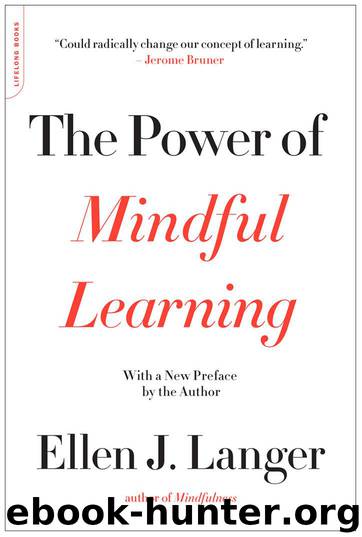The Power of Mindful Learning (A Merloyd Lawrence Book) by Langer Ellen J

Author:Langer, Ellen J. [Langer, Ellen J.]
Language: eng
Format: azw
ISBN: 9780738219097
Publisher: Da Capo Press
Published: 2016-04-04T16:00:00+00:00
KEEPING INFORMATION AVAILABLE
There are alternatives to memorization: mindful ways to learn information so that it serves both the purpose of passing tests in school and that of keeping the information available for future creative use. As mentioned previously, memorization is a way of taking in material when it is personally irrelevant. Making the information relevant can remove the necessity for memorization. Read the following list of words and then look away and see which of them you remember: generous, helpful, authoritative, rigid, dependent, serious, funny, tender, weak, smart. Apart from the words at the beginning and end of the list, which we tend to remember because of their placement, the words we recall effortlessly are likely to be the ones that speak to our self-image. Information that is about ourselves, about the parts of ourselves we really care about, is the easiest to learn.8 For instance, Hazel Markus and her colleagues found that people who have incorporated stereotypical ideas about masculinity or femininity into their self-concepts have better memory for words reflective of this stereotype than do people for whom the stereotype is less important.9 Similarly, imagine that you are trying to lose weight but love eating greasy hamburgers. If someone tells you that one of those tempting burgers contains 2,000 calories, your entire day’s ration, you are likely to remember that number without having to repeat it over and over again to yourself. Psychologists call this the self-reference effect.
Many psychologists view the self as a complex, organized structure involving a variety of attributes or pieces of information about the person.10 When information in a person’s environment is relevant to any of these attributes it is more likely to be remembered. Steeplechase results are more likely to be remembered by those who are involved in horse racing, or who fancy themselves in that role, than by those who have no interest in horses.
The notion of relevance in education is hardly new, and just how relevant material should be has been hotly debated. One problem in making material relevant is the difficulty of doing so for several students at once—students from diverse backgrounds, with different interests and experiences.
There are two ways a teacher can make facts or ideas seem personally important. The most common approach is to shape or interpret ideas so that their relation to the lives, interests, and curiosities of the majority of students is readily apparent. When critics of education clamor for relevance, they are usually speaking of this sort of relevance. The second approach is to change students’ attitudes toward the material, that is, to teach students to make the material meaningful to themselves.
This second approach is illustrated in the way in which actors learn scripts. They read a play through to get an idea of what it is about and to become engaged in its story and meaning. Before they attempt to learn their lines, they consider the meaning of the lines in relation to the larger plot and to the perspectives of the other characters. They begin to know what would bring the other characters to say what they say.
Download
This site does not store any files on its server. We only index and link to content provided by other sites. Please contact the content providers to delete copyright contents if any and email us, we'll remove relevant links or contents immediately.
| Administration | Assessment |
| Educational Psychology | Experimental Methods |
| History | Language Experience Approach |
| Philosophy & Social Aspects | Reform & Policy |
| Research |
The Art of Coaching Workbook by Elena Aguilar(51076)
Trainspotting by Irvine Welsh(21569)
Twilight of the Idols With the Antichrist and Ecce Homo by Friedrich Nietzsche(18566)
Fangirl by Rainbow Rowell(9175)
Periodization Training for Sports by Tudor Bompa(8210)
Change Your Questions, Change Your Life by Marilee Adams(7684)
This Is How You Lose Her by Junot Diaz(6833)
Asking the Right Questions: A Guide to Critical Thinking by M. Neil Browne & Stuart M. Keeley(5708)
Grit by Angela Duckworth(5554)
Red Sparrow by Jason Matthews(5424)
Paper Towns by Green John(5136)
Room 212 by Kate Stewart(5071)
Ken Follett - World without end by Ken Follett(4682)
Housekeeping by Marilynne Robinson(4391)
The Sports Rules Book by Human Kinetics(4342)
Double Down (Diary of a Wimpy Kid Book 11) by Jeff Kinney(4240)
Papillon (English) by Henri Charrière(4227)
The Motorcycle Diaries by Ernesto Che Guevara(4050)
Exercise Technique Manual for Resistance Training by National Strength & Conditioning Association(4018)
